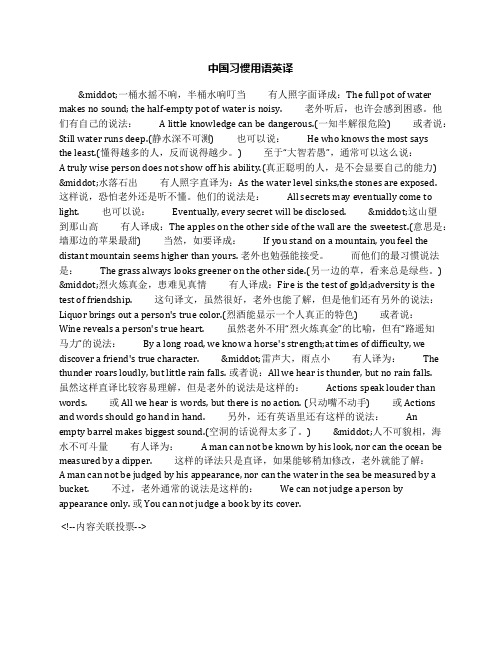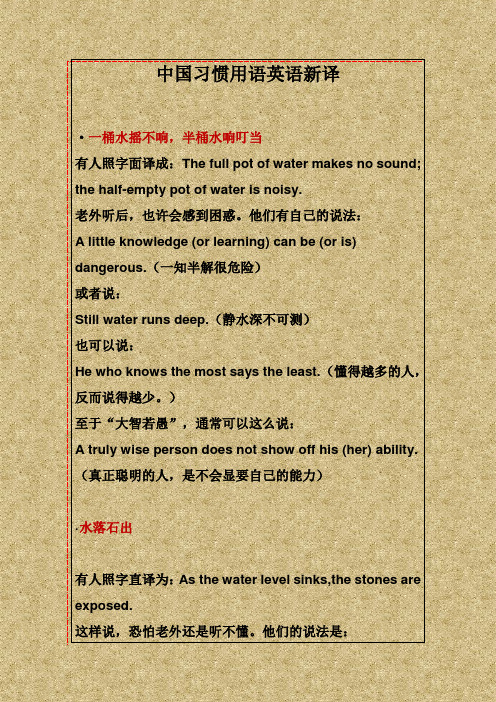中国习惯用语翻译
中国习惯用语英译

中国习惯用语英译·一桶水摇不响,半桶水响叮当有人照字面译成:The full pot of water makes no sound; the half-empty pot of water is noisy. 老外听后,也许会感到困惑。
他们有自己的说法: A little knowledge can be dangerous.(一知半解很危险) 或者说:Still water runs deep.(静水深不可测) 也可以说:He who knows the most saysthe least.(懂得越多的人,反而说得越少。
) 至于“大智若愚”,通常可以这么说:A truly wise person does not show off his ability.(真正聪明的人,是不会显要自己的能力)·水落石出有人照字直译为:As the water level sinks,the stones are exposed.这样说,恐怕老外还是听不懂。
他们的说法是:All secrets may eventually come to light. 也可以说:Eventually, every secret will be disclosed. ·这山望到那山高有人译成:The apples on the other side of the wall are the sweetest.(意思是:墙那边的苹果最甜) 当然,如要译成:If you stand on a mountain, you feel the distant mountain seems higher than yours. 老外也勉强能接受。
而他们的最习惯说法是:The grass always looks greener on the other side.(另一边的草,看来总是绿些。
常用中国谚语的英文翻译

常用中国谚语的英文翻译和外国人聊天,说两句谚语,可以让他们感受到中国文化的博大精深,下面是YJBYS 小编收集的常用中国谚语的英文翻译,仅供大家借鉴学习~A clear fast is better than a dirty breakfast. 宁为清贫,不为浊富。
A close mouth catches no flies. 病从口入,祸从口出。
A cock is valiant on his own dunghill. 夜郎自大。
A common danger causes common action. 同仇敌忾。
A constant guest is never welcome. 久住非佳宾,常来不欢迎。
A contented mind is perpetual feast. 知足常乐。
A covetous man is good to none but worse to himself. 贪婪的人对别人毫无好处,对自己却坏处更大。
A crafty knave needs no broker. 狡猾的流氓,不需居间人。
A creaking door hangs long on its hinges. 户枢不蠹。
A discontented man knows not where to sit easy. 不满足者坐无宁时。
A disease known is half cured. 病情确诊断,治病好一半。
A dog will not howl if you beat him with a bone. 骨头打狗狗不叫。
A fair death honours the whole life. 死得光明,终身荣耀。
A fair face may hide a foul heart. 人不可貌相。
A faithful friend is hard to find. 益友难得。
A fall into the pit, a gain in your wit. 吃一堑,长一智。
中国礼仪用语大全

中国礼仪用语大全在中国,礼仪用语是十分重要的。
它可以表达尊重、友好和关心。
以下是我为大家整理的中国礼仪用语大全。
问候篇1. 早上好(zǎo shàng hǎo) Good morning2. 下午好(xià wǔ hǎo) Good afternoon3. 晚上好(wǎn shàng hǎo) Good evening4. 你好(nǐ hǎo) Hello5. 再见(zài jiàn) Goodbye6. 欢迎(huān yíng) Welcome7. 谢谢(xiè xiè) Thank you8. 不客气(bù kè qì) You're welcome9. 对不起(duì bu qǐ) I'm sorry10. 没关系(méi guān xi) It's okay11. 祝你好运(zhù nǐ hǎo yùn) Good luck12. 祝你生日快乐(zhù nǐ shēng rì kuài lè) Happy birthday13. 祝你新年快乐(zhù nǐ xīn nián kuài lè) Happy Ne w Year14. 祝你身体健康(zhù nǐ shēn tǐ jiàn kāng) Wish you good health15. 祝你幸福快乐(zhù nǐ xìng fú kuài lè) Wish you happiness交际篇16. 请(qǐng) Please17. 请问(qǐng wèn) Excuse me18. 对不起,我迟到了(duì bu qǐ, wǒ chí dào le) Sorry, I'm late19. 不好意思,麻烦你了(bù hǎo yì si, má fán nǐ le) Sorry to trouble you20. 请问你的名字是什么?(qǐng wèn nǐ de míng zì shì shén me) May I ask your name?21. 请问你从哪里来?(qǐng wèn nǐ cóng nǎ lǐ lái) Where are you from?22. 对不起,我听不懂(duì bù qǐ, wǒ tīng bù dǒng) Sorry, I don't understand23. 非常感谢(fēi cháng gǎn xiè) Thank you very much24. 不用谢(bù yòng xiè) Don't mention it25. 很高兴认识你(hěn gāo xìng rèn shí nǐ) Nice to meet you问候语篇26. 祝你新年快乐,万事如意(zhù nǐ xīn nián kuài lè, wàn shì rú yì) Wishing you a happy and prosperous New Year27. 祝你生日快乐,永远年轻(zhù nǐ shēng rì kuài lè, yǒng yuǎn nián qīng) Wishing you a happy birthday and forever young28. 祝你节日快乐(zhù nǐ jié rì kuài lè) Happy holidays29. 祝你健康长寿(zhù nǐ jiàn kāng cháng shòu) Wishing you good health and a long life30. 祝你一切顺利(zhù nǐ yī qiè shùn lì) Wishing you all the best31. 祝你马到成功(zhù nǐ mǎ dào chéng gōng) Wishing you success32. 祝贺你(zhù hè nǐ) Congratulations to you33. 祝新婚快乐(zhù xīn hūn kuài lè) Congratulations on your wedding34. 祝你旅途愉快(zhù nǐ lǚ tú yú kuài) Have a nice tri p35. 请多关照(qǐng duō guān zhào) Please take care of yourself道别篇36. 再见(zài jiàn) Goodbye37. 下次见(xià cì jiàn) See you next time38. 慢走(màn zǒu) Take care39. 保重(bǎo zhòng) Take care of yourself40. 祝你旅途平安(zhù nǐ lǚ tú píng ān) Have a safe jour ney总结中国礼仪用语非常重要,无论是在商务交往还是个人交际中都需要注意。
中国传统词汇翻译

1. 元宵节:Lantern Festival2. 刺绣:embroidery3. 重阳节:Double-Ninth Festival4. 清明节:Tomb sweeping day5. 剪纸:Paper Cutting6. 书法:Calligraphy7. 对联:(Spring Festival) Couplets8. 象形文字:Pictograms/Pictographic Characters9. 人才流动:Brain Drain/Brain Flow10. 四合院:Siheyuan/Quadrangle11. 战国:Warring States12. 风水:Fengshui/Geomantic Omen13. 铁饭碗:Iron Bowl14. 函授部:The Correspondence Department15. 集体舞:Group Dance16. 黄土高原:Loess Plateau17. 红白喜事:Weddings and Funerals18. 中秋节:Mid-Autumn Day19. 结婚证:Marriage Certificate20. 儒家文化:Confucian Culture21. 附属学校:Affiliated school22. 古装片:Costume Drama23. 武打片:Chinese Swordplay Movie24. 元宵:Tangyuan/Sweet Rice Dumpling (Soup)25. 一国两制:One Country, Two Systems26. 火锅:Hot Pot27. 四人帮:Gang of Four28. 《诗经》:The Book of Songs29. 素质教育:Essential-qualities-oriented Education30. 《史记》:Historical Records/Records of the Grand Historian31. 大跃进:Great Leap Forward (Movement)32. 《西游记》:The Journey to the West33. 除夕:Chinese New Year’s Eve/Eve of the Spring Festival34. 针灸:Acupuncture35. 唐三彩:Tri-color Pottery of the Tang Dynasty/ The Tang Tri-colored pottery36. 中国特色的社会主义:Chinese-charactered Socialist/Socialist with Chinese characteristics37. 偏旁:radical38. 孟子:Mencius39. 亭/阁:Pavilion/ Attic40. 大中型国有企业:Large and Medium-sized State-owned Enterprises41. 火药:gunpowder42. 农历:Lunar Calendar43. 印/玺:Seal/Stamp44. 物质精神文明建设:The Construction of Material Civilization and Spiritual Civilization45. 京剧:Beijing Opera/Peking Opera46. 秦腔:Crying of Qin People/Qin Opera47. 太极拳:Tai Chi48. 独生子女证:The Certificate of One-child49. 天坛:Altar of Heaven in Beijing50. 小吃摊:Snack Bar/Snack Stand51. 红双喜:Double Happiness52. 政治辅导员:Political Counselor/School Counselor53. 春卷:Spring Roll(s)54. 莲藕:Lotus Root55. 追星族:Star Struck56. 故宫博物院:The Palace Museum57. 相声:Cross-talk/Comic Dialogue58. 下岗:Lay off/Laid off59. 北京烤鸭:Beijing Roast Duck60. 高等自学考试:Self-taught Examination of Higher Education61. 烟花爆竹:fireworks and firecracker62. 敦煌莫高窟:Mogao Caves63. 电视小品:TV Sketch/TV Skit64. 香港澳门同胞:Compatriots from Hong Kong and Macao65. 文化大革命:Cultural Revolution66. 长江中下游地区:The Mid-low Reaches of Yangtze River67. 门当户对:Perfect Match/Exact Match68. 《水浒》:Water Margin/Outlaws of the Marsh69. 中外合资企业:Joint Ventures70. 文房四宝(笔墨纸砚):"The Four Treasure of the Study" "Brush, Inkstick, Paper, and Inkstone"71. 兵马俑:cotta Warriors/ Terracotta Army72. 旗袍:cheongsam。
惯用语大全汉语常用惯用语

惯用语大全汉语常用惯用语一言堂:旧时商店挂的扁额,表示不二价;现多指领导缺乏民主作风,不能听取群众的意见,个性不能听相反的意见,跟“群言堂”相对。
以下是小编带来的惯用语大全,供各位阅读,希望对大家有帮助。
汉语常用惯用语大全1、安乐窝∶安逸的生活环境或小巧温暖舒适的处所或房间。
2、绊脚石:绊脚的石头,比喻阻碍前进的东西3、应声虫:比喻随声附和的人。
4、恶作剧:捉弄耍笑,使人难堪。
5、红眼病:羡慕别人有名或有利而心怀忌妒的毛病。
6、守财奴:有钱而吝啬的人。
7、紧箍咒:比喻束缚人的东西。
8、点鬼火:比喻鼓动别人做坏事。
9、老大难:形容问题错综复杂。
10、马大哈:“马马虎虎大大咧咧嘻嘻哈哈”的缩略语,指粗心大意的人。
11、擦边球:打乒乓球时擦着球台边沿的球,之后把做在规定的界限边沿的事比喻为打擦边球。
12、磨洋工:工作时拖延时刻,也泛指工作懒散拖沓。
13、变色龙:比喻看风转舵的政治投机分子。
14、一言堂:旧时商店挂的扁额,表示不二价;现多指领导缺乏民主作风,不能听取群众的意见,个性不能听相反的意见,跟“群言堂”相对。
15、背黑锅:比喻代人受过,泛指受冤屈。
16、急先锋:比喻在行动上用心带头的人。
17、中山狼:见马中锡《中山狼传》,比喻恩将仇报,没有良心的人。
18、老掉牙:形容事物言论等陈旧过时。
19、小算盘:比喻为个人或局部利益的打算。
20、开小差:原指军人私自脱离队伍逃跑,后比喻思想不集中。
21、踢皮球:比喻互相推诿,把就应解决的事情推给别人。
22、一窝蜂:形容许多人乱哄哄地同时说话或行动。
23、铁饭碗:比喻十分稳固的职业职位。
24、回马枪:回过头来给追击者的突然袭击。
25、顶梁柱:比喻起主要作用的骨干力量。
26、口头禅:经常挂在口头的词句。
27、牛鼻子:比喻事物的主要矛盾或影响全局的关键。
28、鬼把戏:阴险的手段或政策。
29、一盘棋:比喻整体或全局。
30、鸿门宴:喻指加害客人的宴会。
31、拍马屁:向人谄媚奉承。
一些中国习语的英语翻译

弄巧成拙 be too smart by half 强强联手 win-win co-operation 世上无难事只要肯攀登 /有志者事竟成 Where there is a will, there is a way. 塞翁失马焉知非福 Misfortune may be an actual blessing. 时不我待 Time and tide wait for no man.
•
8、业余生活要有意义,不要越轨。20 20年12 月15日 星期二 8时22 分50秒2 0:22:50 15 December 2020
•
9、一个人即使已登上顶峰,也仍要自 强不息 。下午 8时22 分50秒 下午8时 22分20 :22:502 0.12.15
• 10、你要做多大的事情,就该承受多大的压力。12/15/
•
6、意志坚强的人能把世界放在手中像 泥块一 样任意 揉捏。 2020年 12月15 日星期 二下午 8时22 分50秒2 0:22:50 20.12.1 5
•
7、最具挑战性的挑战莫过于提升自我 。。20 20年12 月下午 8时22 分20.12. 1520:2 2December 15, 2020
拆东墙补西墙 rob Peter to pay Paul 辞旧迎新 ring out the old year and ring in the new 大开眼界 broaden one's horizon 好了伤疤忘了疼 once on shore, one prays no more 和气生财 Harmony brings wealth 活到老学到老 One is never too old to learn.
既往不咎 let bygones be bygones 脚踏实地 be down-to-earth 脚踩两只船 sit on the fence 留得青山在不怕没柴烧 Where there is life, there is hope. 谋事在人成事在天 Man proposes, God disposes.
中国习惯用语英语翻译

中国习惯用语英语新译·一桶水摇不响,半桶水响叮当 有人照字面译成:The full pot of water makes no sound; the half-empty pot of water is noisy. 老外听后,也许会感到困惑。
他们有自己的说法: A little knowledge (or learning) can be (or is) dangerous.(一知半解很危险) 或者说: Still water runs deep.(静水深不可测) 也可以说: He who knows the most says the least.(懂得越多的人, 反而说得越少。
) 至于“大智若愚”,通常可以这么说: A truly wise person does not show off his (her) ability. (真正聪明的人,是不会显要自己的能力)· 水落石出有人照字直译为: As the water level sinks,the stones are exposed. 这样说,恐怕老外还是听不懂。
他们的说法是:All secrets may eventually come to light. (所有祕密最后 总会曝光。
) 也可以说: Eventually, every secret will be disclosed.· 这山望到那山高 有人译成:The apples on the other side of the wall are the sweetest.(意思是:墙那边的苹果最甜) 当然,如要译成: If you stand on a mountain, you feel the distant mountain seems higher than yours. 老外也勉强能接受。
而他们的最习惯说法是: The grass always looks greener on the other side.(另 一边的草,看来总是绿些。
中国习惯用语英译

中国习惯用语(英文翻译)1.一桶水摇不响,半桶水响叮当有人照字面译成:The full pot of water makes no sound; the half-empty pot of water is noisy.老外听后,也许会感到困惑。
他们有自己的说法:A little knowledge (or learning) can be (or is) dangerous.(一知半解很危险)或者说:Still water runs deep.(静水深不可测)也可以说:He who knows the most says the least.(懂得越多的人,反而说得越少。
)至于“大智若愚”,通常可以这么说:A truly wise person does not show off his (her) ability.(真正聪明的人,是不会显要自己的能力)2.水落石出有人照字直译为:As the water level sinks,the stones are exposed.这样说,恐怕老外还是听不懂。
他们的说法是:All secrets may eventually come to light. (所有祕密最后总会曝光。
)也可以说:Eventually, every secret will be disclosed.3.这山望到那山高有人译成:The apples on the other side of the wall are the sweetest.(意思是:墙那边的苹果最甜)当然,如要译成:If you stand on a mountain, you feel the distant mountain seems higher than yours. 老外也勉强能接受。
而他们的最习惯说法是:The grass always looks greener on the other side.(另一边的草,看来总是绿些。
- 1、下载文档前请自行甄别文档内容的完整性,平台不提供额外的编辑、内容补充、找答案等附加服务。
- 2、"仅部分预览"的文档,不可在线预览部分如存在完整性等问题,可反馈申请退款(可完整预览的文档不适用该条件!)。
- 3、如文档侵犯您的权益,请联系客服反馈,我们会尽快为您处理(人工客服工作时间:9:00-18:30)。
·一桶水摇不响,半桶水响叮当有人照字面译成:The full pot of water makes no sound; the half-empty pot of water is noisy. 老外听后,也许会感到困惑。
他们有自己的说法:A little knowledge (or learning) can be (or is) dangerous.(一知半解很危险)或者说:Still water runs deep.(静水深不可测)也可以说:He who knows the most says the least.(懂得越多的人,反而说得越少。
)至于“大智若愚”,通常可以这么说:A truly wise person does not show off his (her) ability.(真正聪明的人,是不会显要自己的能力)·水落石出有人照字直译为:As the water level sinks,the stones are exposed.这样说,恐怕老外还是听不懂。
他们的说法是:All secrets may eventually come to light. (所有祕密最后总会曝光。
)也可以说:Eventually, every secret will be disclosed.·这山望到那山高有人译成:The apples on the other side of the wall are the sweetest.(意思是:墙那边的苹果最甜)当然,如要译成:If you stand on a mountain, you feel the distant mountain seems higher than yours. 老外也勉强能接受。
而他们的最习惯说法是:The grass always looks greener on the other side.(另一边的草,看来总是绿些。
)·烈火炼真金,患难见真情有人译成:Fire is the test of gold;adversity is the test of friendship.这句译文,虽然很好,老外也能了解,但是他们还有另外的说法:Liquor brings out a person's true color.(烈酒能显示一个人真正的特色)或者说:Wine reveals a person's true heart.虽然老外不用“烈火炼真金”的比喻,但有“路遥知马力”的说法:By a long road, we know a horse's strength;at times of difficulty, we discover a friend's true character.·雷声大,雨点小有人译为:The thunder roars loudly, but little rain falls. 或者说:All we hear is thunder, but no rain falls. 虽然这样直译比较容易理解,但是老外的说法是这样的:Actions speak louder than words. (行动胜于言谈)或All we hear is words, but there is no action. (只动嘴不动手)或Actions and words should go hand in hand. (言行必须一致)另外,还有英语里还有这样的说法:An empty barrel makes biggest sound.(空洞的话说得太多了。
)·人不可貌相,海水不可斗量有人译为:A man can not be known by his look, nor can the ocean be measured by a dipper.这样的译法只是直译,如果能够稍加修改,老外就能了解:A man can not be judged by his appearance, nor can the water in the sea be measured by a bucket.不过,老外通常的说法是这样的:We can not judge a person by appearance only. 或You can not judge a book by its cover. (意思是:一本书的好坏取决于它的内容,而不是它的封面装帧的漂亮与否。
)·口蜜腹剑,笑里藏刀有人译为His mouth is honey; his heart is a sword.外国人听了会对这样的比喻摸不着头脑,如果要形容某人“口蜜腹剑,笑里藏刀”,我们可以说with honey on one's lip and murder in one's heart, 或者honey-mouthed but dagger-hearted.也可以更直接的译成He is an evil man who has a mouth that praises and a hand that kills.·少壮不努力,老大徒伤悲有人译成If you neglect study when you are young, what may happen to your old age?这句问句会把老外问得云里雾里,因为他们沒有“学而优则仕”的思想,也不认为功课差,将来就会伤悲。
他们劝告子女经常说的是Studying / working hard can lead you to a brighter / more promising future. (努力用功会带给你光明的前程。
)当然也可以对年轻人说:Study hard when you are young. It will pay off when you get older. (年轻时好好努力,到老的时就会觉得学有所值。
)·学如行舟,不进则退如果直译成:Learning is like rowing upstream; not to advance is to drop back.老外听后,也许会感到一头雾水。
这样修改一下,表达可以清晰一些:Learning seems like rowing upstream(逆流); if one does not advance, one will fall back. Learning is like rowing against the current(激流), if one does not advance, one will retreat. 更直接的说法是:If you don't make progress, you will fall behind.·一日为师,终身为父有这样的译法:He who teaches me for one day is my father for life.If you are my teacher for even one day, you will be my teacher (mentor) all my life.He who teaches me may be considered my father-figure for life.这几种译法意思都是“老师即使对我只有一天的教诲,也会让我一生都受用不尽。
”外国人也有他们表达师生关系的谚语,如:Teach others to fish and they will fish for a lifetime.(授人以鱼,不如授人以渔)Give a man fish, he will have a meal; teach him to fish, he will have food all his life.·忠言逆耳,良药苦口有人译成Faithful words are contrary to the ears; good medicine tastes bitter to the mouth.也有人反译为:Bitter words are medicine; sweet words bring illness.Good advice often jars on the ears; bitter pills have good effects.这些说法,老外也会“一知半解”,不如直接一点说成:Honest advice may be distasteful to the recipient.Honest advice is hard to accept.Truth is a hard pill to swallow.更简单的说就是:Truth hurts.·近墨者黑,近朱者赤有人直译为:one who stays near vermilion gets stained red, and one who stays near ink gets stained black.(vermilion 是朱砂或鲜红色的意思)也有人译成:When you touch black, you become black; when you touch red, you become red.这种说法,恐怕老外一时无法理解真正含意。
不过他们倒有这么说:One takes the behavior of one's company. (一个人的行为,往往受到朋友的影响。
) 或One takes on the attributes of one's associates. (attributes 复数時是指品质、特性;associates 指朋友、同事)简单的说,就是:Watch the company you keep!(小心交朋友!)或者也可以说成:As he who lies with dogs will ride with fleas, how could your son learn anything good by mixing with those people? (你儿子跟那些人混在一起,能学出个好来?)。
